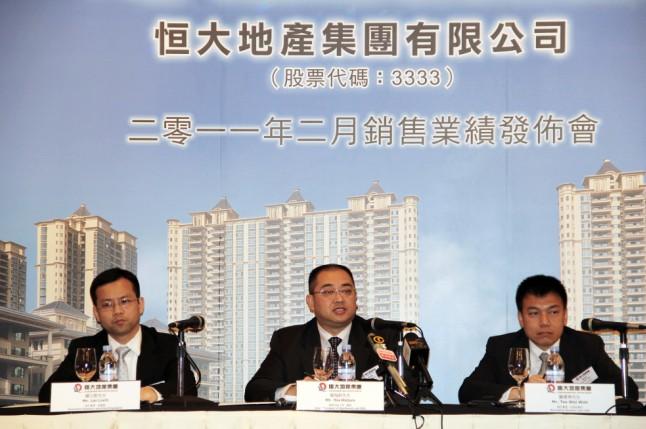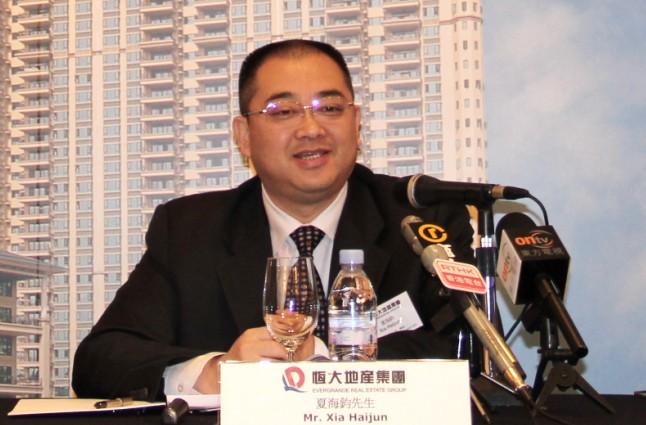Time: March 14, 2011
Place: The Banquet Hall, Floor 5th, Island Shangri-La Hotel, Hong Kong

Host: Good afternoon, friends from the media. Welcome to attend the news conference on Evergrande Real Estate Group Co., Ltd s sales performance of February 2011. Now, please allow me to introduce the management representatives:
Dr. Xia Haijun, Vice-chairman of the Board of Directors and President
Mr. Xie Huihua, Chief Financial Officer and Executive Director
Mr. Lai Lixin, Executive Director and Vice-president
Vice-president Lai Lixin: Thank you. Please allow me to introduce the contracted sales performance of our Company in February 2011.
In February 2011, the contracted sales amount was 4.5 billion yuan, 3.2 times of that in the corresponding period of 2010, which was 1.24 billion yuan, and the sales area was 684,000 square meters, nearly 4 times of that in the corresponding period of 2010, which was 171,000 square meters. The contracted average sales price fell slightly because the sales amount of projects in Guangdong with higher sales price in the corresponding period of 2010 accounted for approximately 30%, while the sales amount of projects of the same type this year accounted for 10.4% only, and the sales amount of other projects was within the normal fluctuation scope.
In January to February 2011, the accumulative contracted sales amount was 14.29 billion yuan, over 3 times of that in the corresponding period of 2010; the accumulative contracted sales area was 2,092,000 square meters, 2.8 times of that in the corresponding period of 2010, which was 758,000 square meters; the accumulative contracted average sales price was 6,828 yuan per square meter, 1.1 times of that in the corresponding period of 2010, which was 6,226 yuan per square meter.
In January to February this year, especially in February when it was the traditional sales off-season, our Company still obtained such outstanding sales performance, mainly benefiting from the forward-looking strategy of our Company. Firstly, our Company focuses on the layout of the second- and third-tier cities in China. In particular, our Company started to develop in the second- and third-tier cities in 2010. The majority of areas where we develop in do not belong to the hotspot macro-control areas, which can still have high growth in the macro-control environment. Our Company has developed in 62 cities of China, including 62% of cities without the policy of purchase restriction. Among the 112 projects we have, 54% of the projects are not subject to the policy of purchase restriction. The additional 46% of the projects in the areas with the policy of purchase restriction are influenced to a very small extent by the policy of purchase restriction because the majority of the projects focus on the first house purchasers with rigid demand.

Q&A of Media
The Economic Observer Newspaper: Would you tell me how and how much the land reserve of Evergrande is at present?
President Xia Haijun: We will promulgate the data on the land reserve once every half a year. This involves the annual report which has not been disclosed, so it is not convenient to disclose the data here.
Hong Kong ET Net: Your contracted sales amount of February decreased on a month-on-month basis. Is it because of the simple factor of lunar calendar holiday or the gradually visible macro-control effect?
President Xia Haijun: Recently, the news media have reported much about the data. The decrease range would be great if we compare each listed company s sales performance of February with that of January on a year-on-year basis. Actually, two factors are involved, but the most important factor is the traditional Lunar New Year of China.
However, our Company s sales amount of January and February was 14.29 billion yuan, over 3 times of that in the corresponding period of last year, which was 4.72 billion yuan. In other words, although we faced the state macro-control this year, the sales performance of Evergrande had a growth of nearly twice on a year-on-year basis. If such growth rate of twice is available every month this year, then the sales performance of Evergrande this year would be worthy of expectation.
Hong Kong ET Net: Another question. The faster increase in the land price in the second-tier cities than your increase means that the gross profit of real estate would be stressed. How do you keep the future gross profit trend?
President Xia Haijun: I d like to talk about the strategy of our Company. Evergrande started to develop in the second-tier cities in 2004, and Evergrande should be one of the developers that developed in all the second-tier cities at the earliest time. The sales amount of 50 billion last year was also due to our development in the second-tier cities. This is a business performance brought by the forward-look strategy of our Company.
Last year, we put forward the strategy of developing in the third-tier cities, another advantage for our Company this year. In addition, we are the earliest to develop in the third-tier cities of China, and the top 20 real estate enterprises have not developed in more than 90% of such third-tier cities. In other words, Evergrande has occupied the first chance in this round of state macro-control. The strategy of developing in the third-tier cities we have been focusing on can effectively avoid the risk of state macro-control, in conformity with the real estate industrial policy in China, and at the same time, we stick to the principle of constructing the residences with high cost-effectiveness which the ordinary people in China can afford, enabling our products to constantly meet the demand of the ordinary people in China.
Due to the strategy of developing in the third-tier cities, we can not only keep our original competitive advantage in the high-quality and low-price land, and maintain our target of constructing the residences which the ordinary people in China can afford, but also can bring reasonable return for our Company which meets our investors requirements.
Hong Kong Economic Times: Please tell us, how does Evergrande deal with the current macro-control?
President Xia Haijun: The good overall business performance of January and February benefits from our forward-looking strategic plan. If we did not develop in the third-tier cities last year, we might face the severe situation after the purchase restriction. Evergrande s forward-looking strategic layout in the third-tier cities of China last year has effectively avoided the influence of Purchase Restriction Order. The reason why we can implement the forward-looking strategy of developing the third-tier cities is that we have the land reserve, the team, the capital and the extensive confidence.
In my opinion, the sales amount of February should be the rock-bottom. Just like last year, from March, our Company would have the growth month by month, in a steady growth situation of course. We have such anticipation this year even though the macro-control policy of the state.
Hong Kong Economic Journal: Evergrande will strive to develop the business in the third-tier cities. Is there any specific proportion? What is the number of third-tier cities accounting for last year? And what does it probably increase to?
President Xia Haijun: There are 39 third-tier cities among the 62 cities in our current layout. The number of third-tier cities we have developed in accounts for 62.9% of the number of cities in the whole country. And among the 112 projects, there are 62 located in the second-tier cities and 44 located in the third-tier cities. The number of third-tier cities accounts for about 40% in our overall projects. I believe this proportion will gradually increase from 40% to 50% or 60% in the future one or two years due to the strategic layout of our Company, and the overall sales contribution of projects in the third-tier cities in 2011 will be considerable.
Related News
- President Xia Haijun Met the Team Including the Director of Panasonic Electric Works Co., Ltd
- RENATO, a Top Foreign Aid from Brazil, Formally Joined in Evergrande Football Club
- President Xia Haijun Met the Team Including the Managing Director of Fitch Ratings and His Party
- Member Hui Ka Yan Attended the 4th Session of 11th CPPCC National Committee
Photos
More>>trade
- Guangdong Evergrande Women s Volleyball Team Won the First Game at 3:1 against
- Minutes of News Conference of Evergrande Real Estate Group on the Sales
- The Nationwide Public Welfare Starting Conference was held, and Wang Yang and
- Chairman Hui Ka Yan Met the Delegation Led by the Mayor of Yancheng City
- Evergrande Held the 2011 Material & Equipment Bidding Meeting, where President
market
- Qiu He, Secretary of Kunming Municipal Party Committee, met Chairman Hui Ka Yan
- Evergrande Women s Volleyball Team Has Set Sail in the 2010-2011 Competition
- Chairman Hui led the senior management of Evergrande Group to visit Gold Mantis
- Committee Member Hui Ka Yan Participated in the Seminar for Members of the
- Chen Zhenggao, Governor of Liaoning Province, met Chairman Hui





